Happiness DefinitionPeople want to be happy, yet the definition of happiness means to each individual varies. Happiness is often an emotional state marked by experiences of joy, satisfaction, contentment, and feeling fulfilled. Although there are various ways to define happiness, it is generally stated that it involves joy and a sense of accomplishment. 
When discussing happiness, most individuals refer to their current state of mind or a general sense of how they feel about life. Due to this tendency, psychologists and other social scientists usually use the phrase "subjective well-being" instead of the more unclear term "happiness" to describe this emotional state. Subjective well-being, as its name suggests, is primarily concerned with how someone feels about their current circumstances. There are two essential elements of happiness (or subjective well-being): 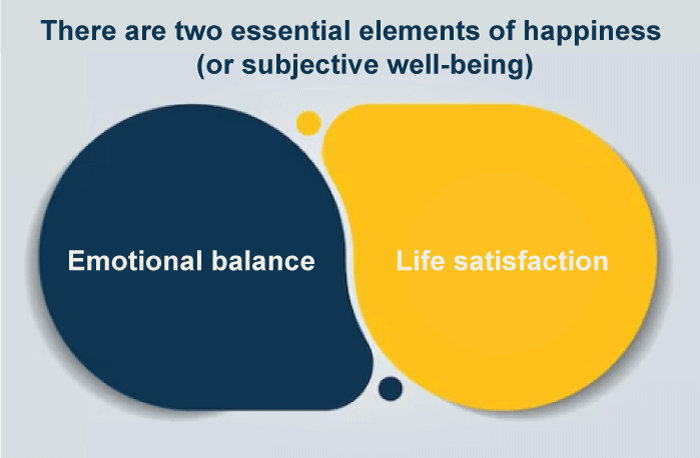
1. Emotional BalanceEveryone experiences both pleasant and negative emotions, sensations, and moods. In general, having more positive than negative sensations is linked to happiness. 2. Life SatisfactionIt describes your level of satisfaction with various life areas, including your relationships, profession, accomplishments, and other things you value highly. Another definition of pleasure is provided by the Greek philosopher Aristotle, who proposed that happiness is the only human goal and that all other human desires exist to fulfill our need for happiness. According to him, happiness may be divided into four categories: happiness that results from instant satisfaction, happiness that results from comparison and success, happiness that results from doing good things, and happiness that results from realizing one's full ability. Happiness Indicators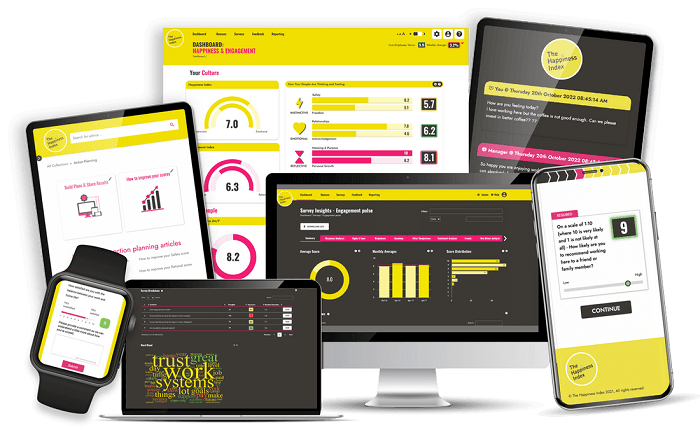
There are certain crucial signals that psychologists look for when evaluating and analyzing pleasure, even if everyone's feelings of happiness may differ. Key indicators of happiness include:
Happiness is the general feeling of having something positive than negative feelings. The range of human emotions, including annoyance, loneliness, boredom, and sadness, will continue to affect cheerful people. They still have a strong hope that things will turn around, that they can handle the situation, and that they will soon be able to experience joy again. Different Kinds of Happiness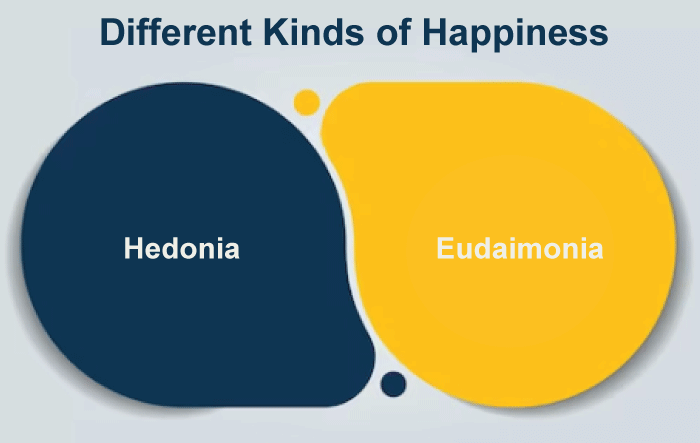
Thinking about happiness can take on a variety of kinds. Greek philosopher Aristotle, for instance, distinguished between two forms of happiness: hedonia and eudaimonia. 1. HedoniaPleasure is the source of hedonic joy. The actions that make you feel good, self-care, satisfying your wants, having fun, and feeling satisfied are the most frequently linked concepts with it. 2. EudaimoniaWhen virtue and importance are desired, this type of happiness occurs. Feeling that your life is meaningful, valuable, and purposeful is crucial to eudaimonic well-being. It is more closely related to upholding one's moral standards, carrying out obligations, investing in long-term objectives, and caring for the welfare of others. In psychology, hedonia and eudemonia are more generally considered pleasure and significance. Recently, psychologists have argued for the inclusion of a third element that is associated with involvement. These are feelings of commitment and participation in many areas of life. According to studies, people who are happy with their lives typically have life satisfaction scores higher than the norm on both the eudaimonic and hedonic scales. It could be more fulfilling than enjoyable to volunteer for a cause you believe in. On the other hand, enjoying your favorite TV show can rate lower on the meaning scale and higher on the enjoyment scale. These are some examples of happiness that might be suitable for one of these three primary groups: 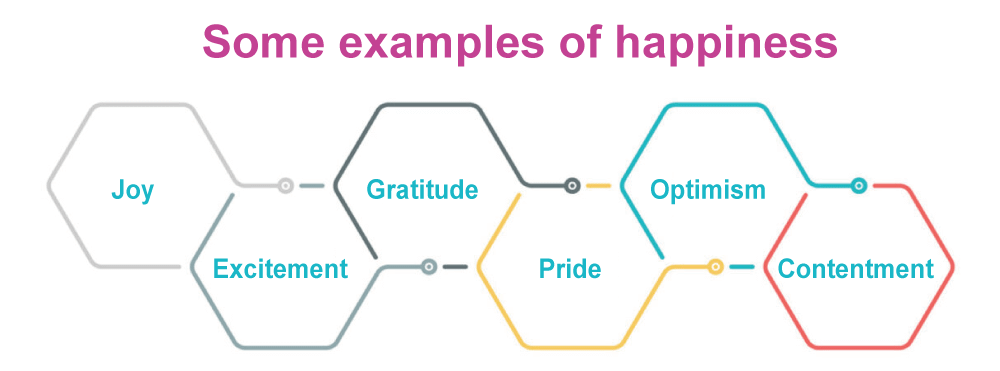
How to Develop Happiness
There are things you can do to maintain your sense of happiness, even if some individuals naturally have a more straightforward attitude. 1. Follow Your Intrinsic GoalsObtaining goals you are inspired to work toward, especially those centered on community service and personal development, might help increase happiness. According to research, following these internally driven goals might lead to more satisfaction than pursuing external goals like acquiring wealth or status. 2. Enjoy Current TimesAccording to studies, people often over-earn because they are so concerned with collecting objects that they fail to recognize how much they truly enjoy their activities for a living. 3. Rephrase Unfavorable IdeasLook for methods to rephrase your thinking more positively when you have a gloomy attitude or feel negative. It's not about rejecting the negative to reset these perceptions. It refers to making an effort to approach situations objectively and realistically. It enables you to see tendencies in your thinking and then address unfavorable ideas. The Effect of Happiness
How to Become Happier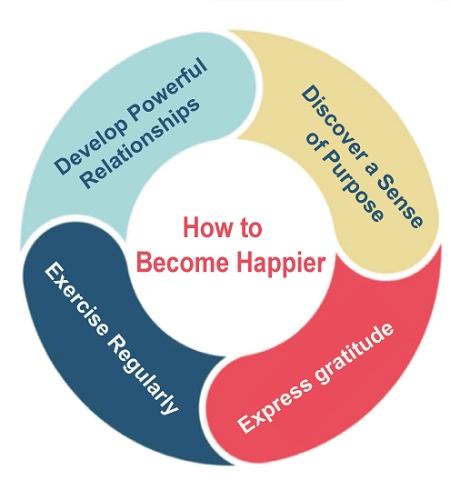
Some people appear to have a greater basic level of happiness than others; extensive research, including more than 2,000 twins, found that genetic background accounted for around 50% of total life satisfaction, external events accounted for 10%, and personal activities accounted for 40%. Therefore, even while your "base level" of happiness may not be something you can influence, there are things you can do to improve your general level of life. Everyone should actively seek happiness since even the happiest individuals occasionally feel melancholy. 1. Develop Powerful RelationshipsA vital component of well-being is social support. Good social connections are the best indicator of happiness, according to research. Positive and encouraging relationships with those you care about may act as a stress reducer, benefit your health, and make you happy. 2. Exercise RegularlyExercise benefits both the body and the mind. Various medical and psychological advantages, including good mood, are associated with physical activity. Regular exercise may help prevent the symptoms of depression, according to several studies, but there is also evidence that it may help individuals feel happy. 3. Express GratitudeParticipants in one study were told to write every night for 10 to 20 minutes before bed. Some were told to write about a little discomfort, some about meaningless happenings, while others were told to express gratitude. According to the results, those who wrote about their appreciation experienced increased happy feelings, enhanced personal pleasure, and higher levels of life satisfaction. According to the researchers who conducted the study, maintaining a gratitude journal is a reasonably quick, cheap, easy, and enjoyable strategy to improve your attitude. 4. Discover a Sense of PurposeAccording to research, those who feel their lives have meaning are happier and happier. The ability to regard your life as having objectives, direction, and meaning is a sign of purpose. Encouraging healthier behaviors could assist in increasing happiness. You may do the following things to help you discover a sense of purpose
Discover new topics you might like to learn more about. Many different things impact this feeling of purpose, but it is also something you can create. Finding a goal that belongs to you and will inspire you to take efficient, positive action in its direction is required. Difficulties of Finding Happiness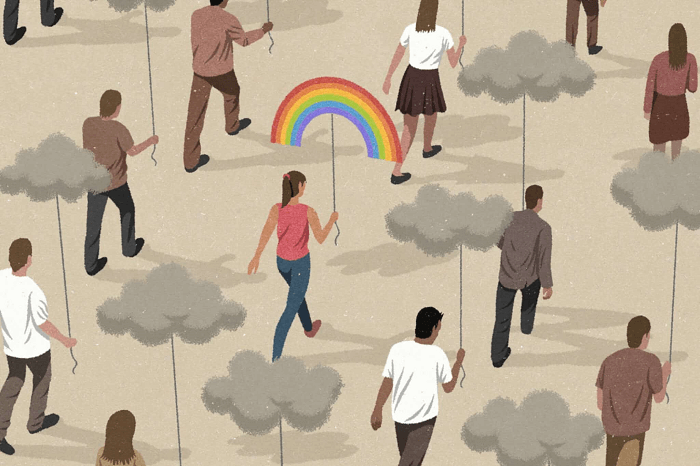
While pursuing happiness is crucial, there are instances when pursuing life fulfillment is sufficient. Look out for the following difficulties: 1. Putting the Wrong Values on Things
2. Not Trying to Get Social Support
3. Consideration of Happiness as a Goal
ConclusionHappiness is frequently the most desired emotion a person may feel out of all the others. It could have less to do with situations outside of oneself and more to do with oneself to create a happy, cheerful existence. Since determining what makes you happy is frequently a personal decision, think about taking charge and designing your desired life. If you want assistance, counseling could help you connect with your interests, objectives, and aspirations to surround yourself with those who and things that make you happy.
Next TopicAdjective Definition
|
 For Videos Join Our Youtube Channel: Join Now
For Videos Join Our Youtube Channel: Join Now
Feedback
- Send your Feedback to [email protected]
Help Others, Please Share










